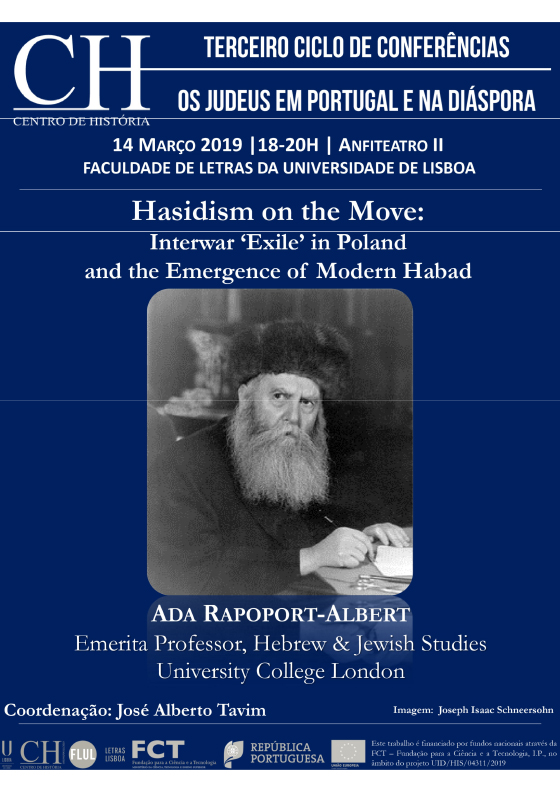Terceiro Ciclo de Conferências – Seminário Os Judeus em Portugal e na Diáspora | Seminários CH-ULisboa | Hasidism on the Move: Interwar 'Exile' in Poland and the Emergence of Modern Habad
Faculdade de Letras da Universidade de Lisboa, 14 de Março de 2019, Anfiteatro II, às 18:00
Organização | Centro de História da Universidade de Lisboa
Descarregar cartaz

The Habad-Lubavitch movement – one of the oldest and most enduring schools of Hasidism – was forced to 'reinvent itself’ when, in response to the Soviet suppression of religion during the 1920s, its leadership went into exile, leaving the bulk of its large hasidic following behind. As a result, the last two Habad leaders, each in turn – first in Interwar Poland, and then, from 1940 on, in the United States – were faced with the challenge of transplanting the movement and replenishing its drastically depleted ranks in an environment that was totally alien to its native Russian-Jewish tradition. For the first time in its history, this highly successful hasidic school, which had thrived in effective 'splendid isolation' throughout the 19th century, when its vast sphere of influence stretched over all the north-eastern provinces of the Jewish Pale of Settlement and beyond, was now having to contend with numerous rival branches of Hasidism, as well as with the accelerated encroachment of secularism on Orthodox Jewish society. The strategies it adopted for confronting these challenges came to determine virtually every one of contemporary Habad's most controversial hallmark. Ada Rapoport-Albert is Professor Emerita of Jewish Studies and former Head of Hebrew and Jewish Studies at University College London (UCL). She specializes in the Jewish mystical tradition, especially Hasidism, the messianic movement of Sabbatai Zevi, ascetic practice in rabbinic Judaism, and gender issues relating to all the above. Her publications include Hasidism Reappraised (1996, as editor), Women and the Messianic Heresy of Sabbatai Zevi, 1666-1816 (2011), Studies in Hasidism: Essays in History and Gender (2018), and, in Hebrew, Studies in Hasidism, Sabbatianism, and Gender (2015).

